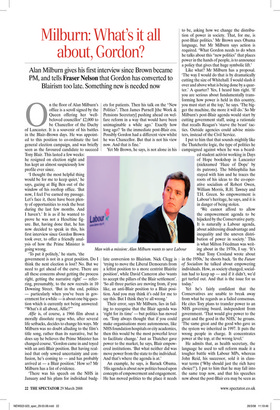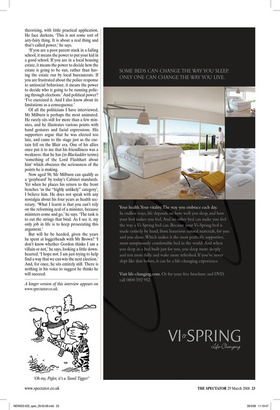Milburn: What’s it all about, Gordon?
Alan Milburn gives his first interview since Brown became PM, and tells Fraser Nelson that Gordon has converted to Blairism too late. Something new is needed now On the floor of Alan Milburn’s office is a scroll signed by the Queen offering her ‘wellbeloved councillor’ £2,000 to be Chancellor of the Duchy of Lancaster. It is a souvenir of his battles in the Blair–Brown days. He was appointed to this position to co-ordinate the last general election campaign, and was briefly seen as the favoured candidate to succeed Tony Blair. This lasted a few weeks: he resigned on election night and has kept an almost suspiciously low profile ever since.
‘I thought the most helpful thing would be for me to keep quiet,’ he says, gazing at Big Ben out of the window of his rooftop office. ‘But now, I feel I’ve earned my passage. Let’s face it, there have been plenty of opportunities to rock the boat during the last few months. And I haven’t.’ It is as if he wanted to prove he was not a Heseltine figure. But, having done that, he has now decided to speak in this, his first interview since Gordon Brown took over, to offer a friendly analysis of how the Prime Minister is going wrong.
‘To put it politely,’ he starts, ‘the government is not in a great position. Do I think the next election is lost? No. But we need to get ahead of the curve. There are all these concerns about getting the process right, getting the narrative right’ — referring, presumably, to the new recruits in 10 Downing Street. ‘But in the end, politics — particularly when you’ve been in government for a while — is about one big question which is currently not being answered: “What’s it all about, Alfie?”’ Alfie is, of course, a 1966 film about a morally dissolute rogue who, after several life setbacks, decides to change his ways. Mr Milburn was no doubt alluding to the film’s title song, rather than its narrative, but he does say he believes the Prime Minister has changed course. ‘Gordon came in and toyed with an anti-Blair position. But having realised that only sowed uncertainty and confusion, he’s coming to — and has probably arrived at — a Blair position.’ How so? Mr Milburn has a list of evidence.
‘There was his speech on the NHS in January and his plans for individual budg ets for patients. Then his talk on the “New Politics”. Then James Purnell [the Work & Pensions Secretary] pushing ahead on welfare reform in a way that would have been unimaginable a while ago.’ Exactly how long ago? ‘In the immediate post-Blair era. Possibly Gordon had a different view whilst he was Chancellor. But that is not his view now. And that is fine.’ Yet Mr Brown, he says, is not alone in his late conversion to Blairism. Nick Clegg is ‘trying to move the Liberal Democrats from a leftist position to a more centrist Blairite position’, while David Cameron also ‘wants to accept the pillars of the Blair settlement’. ‘So all three parties are moving from, if you like, an anti-Blair position to a Blair position. And you may think it’s odd for me to say this. But I think they’re all wrong.’ Their error, says Mr Milburn, lies in failing to recognise that the Blair agenda was ‘right for its time’ — but politics has moved on. ‘Tony always thought that if you could make organisations more autonomous, like NHS foundation hospitals or city academies, then this would be the most powerful lever to facilitate change.’ Just as Thatcher gave power to the market, he says, Blair empowered institutions. ‘But what neither did was move power from the state to the individual. And that’s where the agenda is at.’ An example, he says, is Barack Obama. ‘His agenda is about new politics based upon concepts of empowerment and engagement. He has moved politics to the place it needs to be, asking how we change the distribution of power in society. That, for me, is post-Blair politics.’ Mr Brown uses Obama language, but Mr Milburn says action is required. ‘What Gordon needs to do when he talks about this “new politics” that places power in the hands of people, is to announce a policy that gives that huge symbolic lift.’ Like what? Mr Milburn has a proposal. ‘The way I would do that is by dramatically cutting the size of Whitehall. I would slash it over and above what is being done by a quarter.’ A quarter? Yes, I heard him right. ‘If you are serious about fundamentally transforming how power is held in this country, you must start at the top,’ he says. ‘The bigger the machine, the more it will do.’ So Mr Milburn’s post-Blair agenda would start by cutting government staff, using a rationale that recalls Reagan’s ‘starve the beast’ tactics. Outside agencies could advise ministers, instead of the Civil Service.
I put to him that that sounds mightily like the Thatcherite logic, the type of politics he campaigned against when he was a bearded student activist working in Days of Hope bookshop in Lancaster (nicknamed ‘Haze of Dope’ by its patrons). The bibliophilia has stayed with him and he traces the roots of his ideas to the co-operative socialism of Robert Owen, William Morris, R.H. Tawney and T.H. Green. So empowerment is Labour’s heritage, he says, and it is in danger of being stolen.
‘We cannot afford to allow the empowerment agenda to be hijacked by the Conservative party. It is naturally a Labour agenda, about addressing disadvantage and inequality and the uneven distribution of power in society.’ This is what Milton Friedman was writing about in the 1970s, I say. ‘It’s what Tony Crosland wrote about in the 1950s,’ he shoots back. ‘In the Future of Socialism he talked about empowering individuals. How, as society changed, socialism had to keep up — and if it didn’t, we’d get turfed out. And that is the issue for us today.’ Yet he’s fairly confident that the Conservatives are unable to break away from what he regards as a failed consensus. He cites Tory plans to transfer power to an NHS governing board, independent from government. ‘That would give power to the great and the good in the NHS,’ he groans. ‘The same great and the good who gave us the system we inherited in 1997. It puts the wrong people in charge. It concentrates power at the top, at the wrong level.’ He admits that, as health secretary, the language he used to sell reform made it a tougher battle with Labour MPs, whereas John Reid, his successor, sold it in classwar terms (‘Why should just the rich have choice?’). I put to him that he may fall into the same trap now, and that his speeches now about the post-Blair era may be seen as theorising, with little practical application. He face darkens. ‘This is not some sort of airy-fairy thing. It is about a real thing and that’s called power,’ he says.
‘If you are a poor parent stuck in a failing school, it means the power to put your kid in a good school. If you are in a local housing estate, it means the power to decide how the estate is going to be run, rather than having the estate run by local bureaucrats. If you are frustrated about the police response to antisocial behaviour, it means the power to decide who is going to be running policing through elections.’ And political power? ‘I’ve exercised it. And I also know about its limitations as a consequence.’ Of all the politicians I have interviewed, Mr Milburn is perhaps the most animated. He rarely sits still for more than a few minutes, and he illustrates various points with hand gestures and facial expressions. His supporters argue that he was elected too late, and came to the stage just as the curtain fell on the Blair era. One of his allies once put it to me that his friendliness was a weakness: that he has (in Blackadder terms) ‘something of the Lord Flashhart about him’ which obscures the seriousness of the points he is making.
Now aged 50, Mr Milburn can qualify as a ‘greybeard’ by today’s Cabinet standards. Yet when he places his return to the front benches ‘in the “highly unlikely” category’, I believe him. He does not speak with any nostalgia about his four years as health secretary. ‘What I learnt is that you can’t rely on the reforming zeal of a minister, because ministers come and go,’ he says. ‘The task is to cut the strings that bind. As I see it, my only job in life is to keep prosecuting this argument.’ But will he be heeded, given the years he spent at loggerheads with Mr Brown? ‘I don’t know whether Gordon thinks I am a villain or not,’ he says, looking a little downhearted. ‘I hope not. I am just trying to help find a way that we can win the next election.’ And, for once, he sits entirely still. There is nothing in his voice to suggest he thinks he will succeed.
A longer version of this interview appears on www.spectator.co.uk.

















































































 Previous page
Previous page